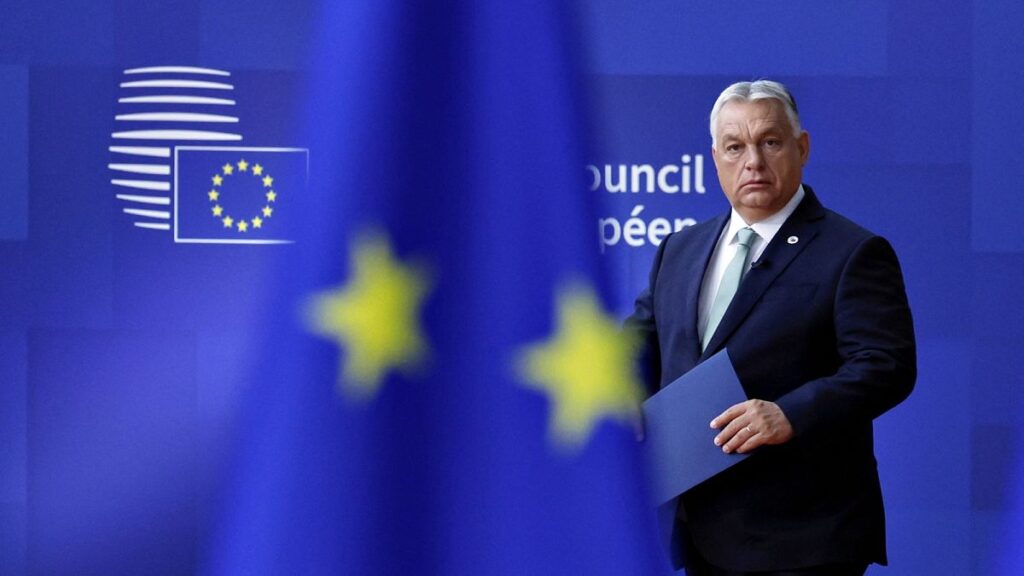There are “no objective reasons” to prevent Ukraine from launching the first phase of its accession process, the European Commission has said in response to Viktor Orbán’s veto, which the Hungarian leader reconfirmed during last week’s EU summit.
“When a candidate country is held back for no objective reason, despite meeting the criteria, the entire enlargement process loses its credibility,” a spokesperson for the European Commission said on Tuesday.
According to Orbán, 95% of almost 2.3 million participants who answered a recent national consultation opposed Ukraine’s membership in the bloc. Turnout was roughly half the 5.5 million votes recorded during national elections in 2022.
Orbán cited the results when doubling down on his veto, saying during the summit: “I came here with a strong mandate.”
“If a member of the European Union is in a war, it means that the European Union is in the war, and we don’t like it.”
On Tuesday, the Commission replied by underscoring Ukraine’s readiness to open the first cluster of negotiations, which covers key topics such as democracy, human rights, security, the judicial system and public procurement.
The cluster, known as “Fundamentals”, is the first to be opened in the multi-pronged enlargement process and the last one to be closed.
Every step requires the unanimity of all 27 member states.
“On our side, things are really clear: as we speak, Ukraine is delivering on reforms in the most difficult circumstances that one can imagine,” the spokesperson said.
“We have always defended a merit-based approach when it comes to accession, and there are no objective reasons in this case to object to the opening of cluster one.”
“We really hope that we can still open the first cluster very soon,” he added.
The Commission has also positively assessed Ukraine’s action plan to strengthen the protection of minorities inside the country, which seeks to harmonise domestic law with European standards to combat discrimination and hate crimes based on ethnic grounds, ensure equal access to public services and promote cultural diversity.
The action plan was designed to assuage Orbán’s concerns: his government has often accused Ukraine of violating the language rights of about 150,000 ethnic Hungarians who live mostly in the Transcarpathia region. The two countries had engaged bilaterally to discuss the issue, but the talks suddenly collapsed in May when Kyiv exposed a suspected Hungarian spy network working against Ukrainian interests.
Unconscious decoupling?
Orbán’s veto on Ukraine’s accession dates back to July 2024, when Hungary took over the six-month presidency of the EU Council and made clear that Kyiv would not open a single cluster for the duration of the rotation.
Officials and diplomats in Brussels scoffed at the position and hoped to make progress after Poland assumed the chairmanship in January. But the Polish presidency came and went, and nothing happened on that front. The new holder, Denmark, has described enlargement as a “geopolitical necessity” and is keen to break the deadlock.
The national consultation, however, has added a new element in the saga and given Orbán a “mandate”, as he called it, to maintain the increasingly contentious blockade.
Meanwhile, patience is wearing thin in Kyiv. During last week’s summit, a frustrated President Volodymyr Zelenskyy used his virtual speech to urge resolution.
“What’s needed now is a clear political message – that Ukraine is firmly on the European path, and that Europe stands by its promises. Any delay by Europe at this point could create a global precedent – a reason to doubt Europe’s words and commitments,” Zelenskyy told leaders in the room, including Orbán.
“We are doing our part. It’s fair to expect a positive response. So opening Cluster One of ‘Fundamentals’ in the negotiation process could be more than just a technical step. It would be a political decision that defines Ukraine’s future integration with Europe.”
At the end of the summit, Ursula von der Leyen voiced her support but without offering any clues on how to solve the months-long dispute.
“Under relentless fire, Ukraine is passing reform after reform. It’s impressive,” the Commission president said. “Ukraine has delivered – now we must too. Because the accession process is based on merit. And Ukraine merits moving forward.”
The impasse is so entrenched that diplomats have begun mulling the idea of decoupling Ukraine’s and Moldova’s bids. The two Eastern countries applied for membership almost at the same time, shortly after Russia launched the full-scale invasion, and were declared candidates on the same day in June 2022. Since then, they have moved together.
The Commission considers both equally ready to open the first cluster and is waiting for member states to give their unanimous go-ahead.
Orbán has not voiced any reservations towards Moldova, meaning that, technically speaking, it could advance in the negotiations while Ukraine waits for the veto to be lifted. Decoupling, though, is a high-stakes gamble, as it risks leaving Kyiv permanently behind and perpetuating the impression of a broken promise to the Ukrainian people.
“We are not requesting the decoupling of Moldova. It’s for the member states to decide if they want to do so,” the Commission spokesperson said. “What we want to do is to support Ukraine and Moldovans in the process to prepare for accession.”
Read the full article here


